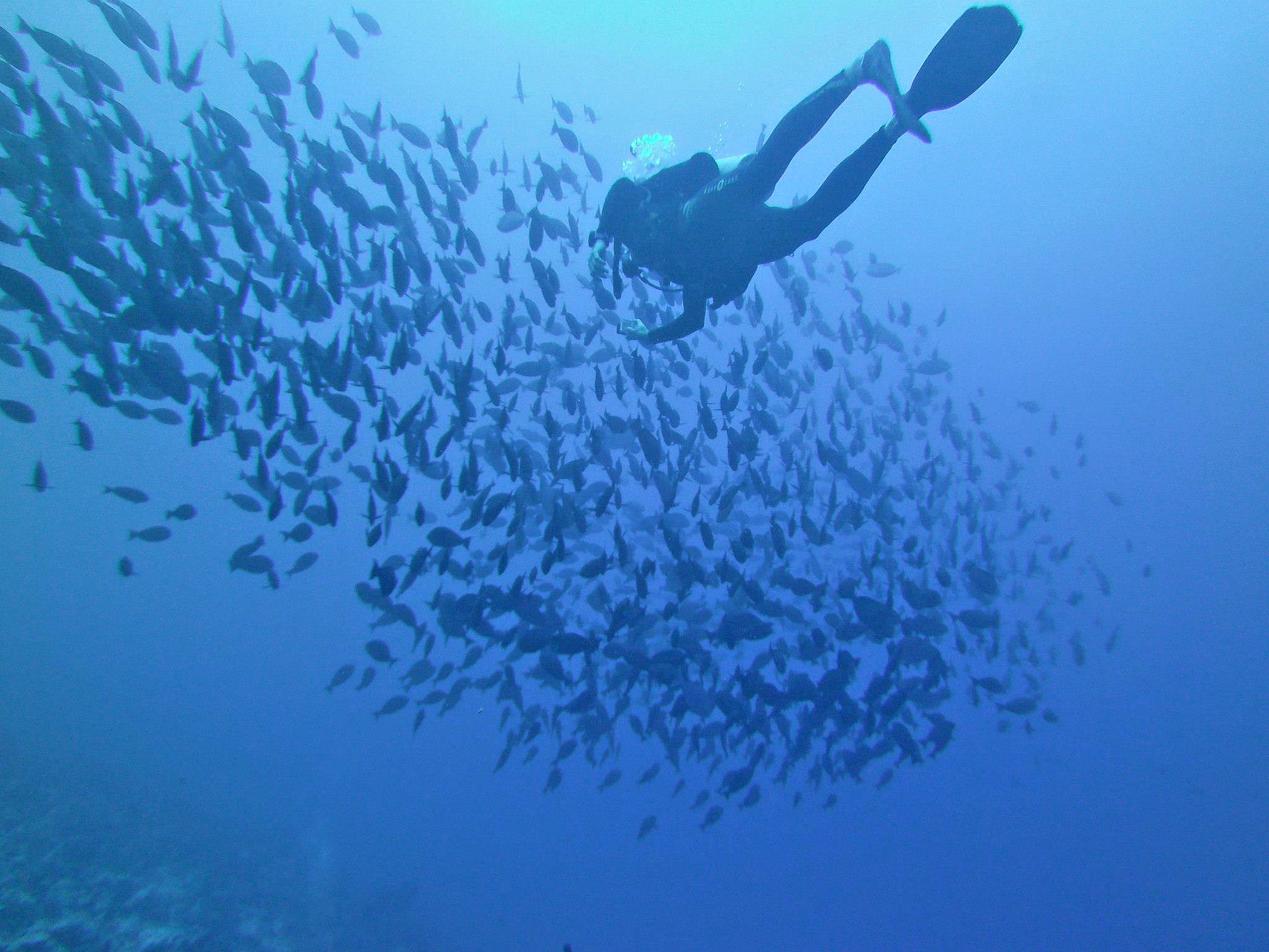The World Below: Vicksburg residents traverse the globe for diving adventure
Published 11:14 am Monday, July 18, 2022

- (Photo courtesy of Mark Posey and Lee Tidwell)
The places Mark Posey and Lee Tidwell have visited over the years are some of the most desirable vacation spots in the world.
The Bahamas. The Florida Keys. Tahiti. Cozumel. Indonesia.
The photos, videos and tales they’ve brought back, however, are from another world.
A video of dozens of sharks circling, while the sound of air bubbles and the ocean current fill the microphone. Colorful photos of lionfish, coral and moray eels. Stories of incredibly close encounters with leviathans.
“Ten feet below me was a huge whale shark. It was 33 feet long,” Tidwell said. “It came up to me and stopped. I was just petting it. It was the most surreal thing.”
Posey and Tidwell are part of a community of scuba diving enthusiasts in Vicksburg and Central Mississippi. Visiting the undersea world has been their passion for decades, and each trip below the waves offers the promise of something new.
“I have been diving some of these sites for 12 years and I never get tired of them because you never see the same thing,” Posey said. “I’ve had pods of dolphins, manta rays, barracuda … you never know what you’re going to see. It’s the anticipation of what you’re going to see.”
GETTING THEIR FEET WET
The 67-year-old Posey started diving in 2000, but initially intended to do it for commercial rather than recreational purposes.
“My best friend had a large boat in Destin. He decided we needed to learn to dive so we could work on the boat and spearfish. He never finished his certification, but I did,” Posey recalled with a laugh. “The first time I dove on bridge rubble in Destin and saw the sheer number of fish it was like I was Jacques Cousteau.”
Before long, Posey was going on recreational dives all across the Caribbean, Gulf of Mexico and the Atlantic Ocean. Alongside his wife Robyn Lea, he has racked up 351 dives ranging from the Texas coast, the Bahamas in the Mid-Atlantic, and down to South America.
Future trips are planned to Indonesia and the Maldives in the Indian Ocean, and his favorite spot is an island called Bonaire located about 50 miles off the coast of Venezuela.
All of Posey’s adventures are chronicled in a small notebook that accompanies him on every trip. It includes both technical details of the dive and notes on the sights he saw.
Posey has also become a talented underwater photographer. He started experimenting after about 50 dives, and a small waterproof camera that shoots video and still photos is now part of his standard loadout.
“I sometimes forget how freeing it is to not take the camera, and to just dive and enjoy it,” he said.
Tidwell, meanwhile, first put on a scuba tank in 1988, at the age of 24. She’d always had a love for the water and decided to take it to the next level by getting her scuba certification from a dive shop in Jackson.
“I just wanted to learn. I worked at ERDC. I’m an engineer. I think I just wanted to know how it works,” Tidwell said. “Watching those old underwater movies as a child, and loving the water so much made me want to dive and it was a new thing in Jackson at the time. If it’s something I want to do, I just end up doing it. I was born wanting to be in the water.”
Tidwell has gone on approximately 100 dives since then, ranging from the Gulf of Mexico to Tahiti. The former was where she petted the whale shark, 22 miles off the coast of Pensacola, Fla. The latter has quickly become her favorite dive spot.
“On my 40th birthday I’d always wanted to go to Tahiti, so we did,” she laughed. “We’ve been back seven times.”
Scuba diving has also become a family hobby for Tidwell and her children. Her son Blake and daughter Morgan are both certified and have a number of dives to their credit.
“It really is a wonderful thing to do with your family if you’re water people,” she said.
For Tidwell, diving is only part of the fun. One of its appeals, she said, is traveling to different countries and experiencing different cultures — not just the local ones, but those that gather from around the world.
“I like to go to places where there’s not even people, when the boat’s not full and you can see the culture,” she said. “Most places we go, we never see any other English-speaking people. You have Italians, Russians, Spanish … people from everywhere.”
LEARNING TO DIVE
Although it can be an enthralling experience, scuba diving is also an inherently dangerous one that requires some training.
Completion of a scuba certification course is not legally required in most states and countries, but it is highly recommended and most boat operators will require it before they let anyone dive.
Deep South Scuba in Jackson offers two-day, 16-hour certification classes costing between $200 and $450, while Bayou Divers in Monroe has classes ranging from $250 to $500. For those going on vacation, many resorts also offer classes.
Most beginner classes include classroom instruction, several dives in a swimming pool, and one open water dive as a final exam.
Different certifications are needed for open water ocean diving and freshwater diving in lakes or rivers. The latter often involves poor visibility and obstacles, and is much more technical and difficult. Other certifications are required for deeper dives.
The certification course focuses on the basics, but even those are essential to make sure that what goes down comes back up safely. Scuba diving is not nearly as simple as strapping on a tank and flipping into the water, Posey said.
“It teaches you how to set your gear up, emergency procedures, things like that. You need to understand the principles to be able to dive safely, and how to breathe compressed air,” Posey said. “You can get certified in two days if you have a one-on-one instructor. For me it took three or four trips in a swimming pool and one open water trip. You don’t need to be an Olympic swimmer or a Navy SEAL. You do need to be able to swim.”
One of the trickiest parts of diving is understanding some basic chemistry.
Scuba tanks use compressed air that is a mixture of nitrogen and oxygen. Modern equipment tracks it with a handheld computer, and monitoring the proper mixture is a key component of safe diving. Some mixtures can be deadly if breathed in below a very specific depth.
If divers ascend too quickly, the change in air pressure can also cause nitrogen bubbles to form in the bloodstream. As the bubbles spread through the body they cause a potentially fatal condition called decompression sickness or “the bends.”
Avoiding decompression sickness is relatively easy. Divers must spend a certain amount of time at specific depths as they ascend in order to dissolve the nitrogen in their body and equalize the pressure.
Most dives last between 30 and 60 minutes and rarely go below 90 feet, in order to provide time to slowly and safely return to the surface. The limit for recreational diving is 130 feet.
“That’s what you need to understand, so you don’t go down too fast, stay too deep, stay down too long,” Posey said.
Other important lessons in certification courses include how to handle emergencies like equipment malfunctions or a mask coming off. Diving in pairs is drilled into students as well, to assist with those situations.
Tidwell said she once shared a breathing regulator with a dive partner whose own equipment had malfunctioned.
Most rigs contain a primary mouthpiece as well as a backup for that sort of situation.
“Your mask can fall off at 90 feet. You don’t leave your buddy,” Tidwell said. “If your mask does fall off or your computer dies, you have your buddy to help you.”
Other hazards of the deep can also rear their ugly heads. Submerged fishing line can entangle a diver and is often found along the Gulf Coast, Posey said. He carries a small knife in his scuba vest to cut his way out if need be.
And while sharks inspire fear, smaller organisms are far more menacing.
Lionfish, frequently found in the Caribbean, are highly venomous. Coral is razor sharp and can cut deep with just a touch. Corals, jellyfish and other venomous species can sting and cripple a diver when they’re most vulnerable.
Among the many lessons to be learned, Posey said, is to take a hands-off approach to sea life.
“You don’t want to touch anything down there. Fire coral will light you up. Lionfish are venomous. There are animals that will sting you,” Posey said. “The motto is to take only pictures and leave only bubbles. Only thing I’ll take is trash that doesn’t belong. And even then I’ll sometimes leave it. Even bottles, something might have moved into.”
THE REWARDS OF DIVING
While there are plenty of perils on even the simplest dive, the rewards are worth it for Posey and Tidwell. From the journey to the dive site to the sights that can only be seen underwater, each trip to the depths offers the promise of a unique high.
“The sheer number of colors of marine life is mind-boggling,” Posey said. “You’re weightless. If you ever dreamed you could be like a bird, you can when you’re diving … In the water, you slip the bonds of gravity. It’s 50 pounds of gear, and as soon as you hit the water it’s not there.”
Scuba diving is also an activity that seems to know no age limit. Posey has plenty of plans for more dives even as he approaches 70. Indonesia, the Maldives and Iceland are all places he’d like to visit before hanging up his regulator.
“Those are on my bucket list. I want to do Iceland, but it’s a different kind of water up there. I have to get certified for a dry suit because it’s so cold,” he said.
The 58-year-old Tidwell, meanwhile, has had her diving limited the past couple of years because of the COVID pandemic and some broken bones suffered in a snow skiing accident.
She has plenty of space left in her dive book, though, and is hoping to add one entry in particular.
“I’m hoping to be able to scuba dive with my grandkids,” she said. “That would be awesome.”






